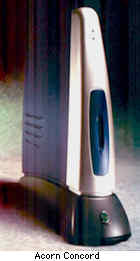
Acorn launches fast home NC
Reprinted by kind permission of the author Jim DavisCopyright © 1995-97 CNET, Inc. All rights reserved
Taken from NEWS.COM
Acorn launched one of the fastest set-top boxes today with 233-MHz processor, more evidence that the newest generation of simplified Internet access devices are gaining desktop PC-like power.
Acorn's new Concord network computer (NC) advances the platform used by RCA for its recently introduced set-top box. The Concord is compatible with Oracle subsidiary NCI's NC reference design--a design which was originally licensed to Oracle from Acorn.
The new system will offer a 233-MHz
 32-bit StrongARM processor from Digital and twice as much
standard memory (8MB) as its predecessor. This compares with the current
Acorn design, which uses a 40-MHz 32-bit ARM processor.
32-bit StrongARM processor from Digital and twice as much
standard memory (8MB) as its predecessor. This compares with the current
Acorn design, which uses a 40-MHz 32-bit ARM processor.
Also, support for Java applications has been added, a first according to Acorn. Java support is so new that Acorn itself will have to add support to Java for displaying digital images on televisions.
WebTV Networks, a subsidiary of Microsoft, updated its set-top box design earlier in September with a 167-MHz, 64-bit MIPS processor and also added for the first time a hard disk drive for storing data. WebTV set-top boxes are currently sold and manufactured by Sony and Philips. When the new box was introduced at a cost of $300, the older boxes were immediately reduced to $199 and an additional $100 rebate was being offered for a limited time.
Offering more functions in a device in rapid-fire succession is a well-known phenomenon in the computer industry--as is having a product depreciate in value rapidly. But as PC manufacturers look at ways to sell Internet appliances for an interactive television experience to less sophisticated audiences, they have to be cautious about customers who are not used to upgrading devices nearly as often.
Convergence products may gain wider acceptance in the home than conventional PCs because companies are trying to make them easier to use and set up--and also address fears of buying a product that rapidly becomes obsolete.
Most industry analysts estimate that about 40 percent of U.S. households have PCs today, but the convergence trend could increase those numbers to 50 percent by the end of the century. If consumers see Internet appliances become too computer-like in their rapidly changing features, they could be turned off to the devices before they even show up in significant numbers on store shelves.
In related news, Yamaha and Access Corporation, a major producer of software for Internet access appliances, have developed a device that enables TVs to access the Net as well as text-only broadcasts.
The device uses a microprocessor from Hitachi as well as an integrated circuit for processing sound and images made by Yamaha. It will cost around $1,300 U.S. dollars, including the Access-made software, company sources told the Nihon Keizai Shimbun, Japan's largest business daily.
Telvisions with the device will also be able to receive free broadcasts of ADAMS-T, a news, weather and lifestyle information channel to be started in April 1998 by an affiliate of Asahi Broadcasting, the report said.
poppy@poppyfields.net